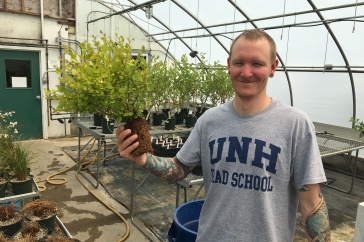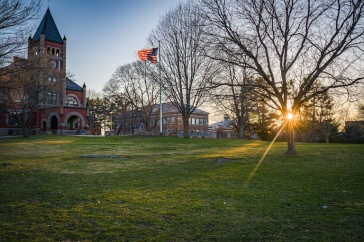
Earth and Environmental Sciences doctoral student Amanda Daly was recently named a Presidential Management Fellowship (PMF) program finalist. The highly competitive two-year program connects finalists with participating federal agencies looking to hire exceptional advanced-degree candidates for what will potentially lead to a successful career in public service.
The program is a good fit for Daly, who came to UNH in 2011 to study soil health and is interested in bridging the gap between scientists and the public and influencing agricultural policy. Her research focuses on finding solutions that will allow farmers to reduce the use of fertilizer and increase soil health and productivity.
“Reducing fertilizer use is very important because we have a massive problem with excess fertilizer running into waterways, bodies of water, groundwater,” she says. “When nutrients from fertilizer get into drinking water, they pose health hazards for humans. In lakes and oceans, they cause algae to grow out of control and create oxygen-starved dead zones where fish and other marine life can’t survive. So much excess fertilizer is flowing down the Mississippi from the Midwest that it is creating a dead zone the size of New Jersey in the Gulf of Mexico.”
The more we learn about soil microbes, the more we understand how we should manage them — and often what we find changes how we define best farming practices.
For the Moretown, Vermont native, the path to a career in soil science began with a small plot in a community garden she tended while working as a lab technician researching pediatric cancer and organ biofabrication at the University of Vermont (UVM). Her small garden, coupled with the influences of Burlington’s thriving local food scene, got her thinking about the soil where food is grown and how soil health affects agricultural production and sustainability.
So, Daly consulted the head of plant and soil sciences at UVM, who helped her develop a list of researchers whose work aligned with her interests. She applied to UNH specifically to work with Stuart Grandy, associate professor of natural resources and the environment, NH Agricultural Experiment Station researcher and a highly regarded soil scientist.
“I’m well-positioned coming from Stuart’s soil biochemistry and fertility lab because I understand the science behind soil health,” she says. “I know how to translate the science for the ‘real world’ to make sure we’re basing decisions on solid evidence. The more we learn about soil microbes, the more we understand how we should manage them — and often what we find changes how we define best farming practices.”
Grandy describes Daly as an invaluable member of his lab and an excellent mentor for the staff, which includes four other graduate students and, at any given time, an average of five undergrads.
“Amanda is a great communicator and has a very promising future as somebody who is building bridges between scientists and policymakers and farmers,” says Grandy. “There aren’t a lot of people doing the research she’s doing, and she’s really addressing some very important questions about how we can reduce fertilizer inputs and minimize nutrient losses in agricultural systems.”
Awards are nothing new for Daly. She won a Dissertation Year Fellowship from the UNH Graduate School, a National Science Foundation (NSF) Graduate Research Fellowship and an NSF Graduate Research Opportunities Worldwide Fellowship, which allowed her to spend a year conducting research at the University of Vienna in Austria.
Past achievements notwithstanding, Daly is amazed and excited about being chosen for the prestigious PMF program, which selects only 425 finalists from a pool of more than 6,000 applicants. She now has one year to find a job with one of the program’s participating federal agencies.
“My dream would be to work in a program like the soil health division of the Natural Resources Conservation Service,” says Daly. “Soil health is a burgeoning movement in agriculture, and farmers are very interested and excited about caring for their soil in a way that will improve productivity but is also environmentally sustainable. Farmers are seeing that soils are visibly in decline, so they’re worrying about soil biology and working to return their soils to the level of health they once were — or even better. In the end, it’s about their livelihood, not politics.”
Daly’s interest in influencing policy makes government an attractive landing spot professionally, but she hasn’t ruled out nonprofit work or academia. For now, all that matters to her is being able to make a difference, both for farmers and for the environment.
“I can’t image not being involved in the public good with my work,” she says.
-
Written By:
Sarah Schaier | College of Life Sciences and Agriculture



















































